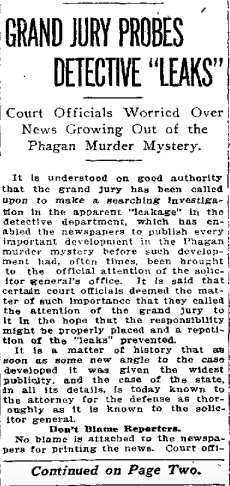 Another in our series of new transcriptions of contemporary articles on the Leo Frank case.
Another in our series of new transcriptions of contemporary articles on the Leo Frank case.
Atlanta Constitution
Friday, June 6th, 1913
Court Officials Worried Over News Growing Out of the Phagan Murder Mystery.
It is understood on good authority that the grand jury has been called upon to make a searching investigation in the apparent “leakage” in the detective department, which has enabled the newspapers to publish every important development in the Phagan murder mystery before such development had, often times, been brought to the official attention of the solicitor general’s office. It is said that certain court officials deemed the matter of such importance that they called the attention of the grand jury to it in the hope that the responsibility might be properly placed and a repetition of the “leaks” prevented.
It is a matter of history that as soon as some new angle to the case developed it was given the widest publicity, and the case of the state, in all its details, is today known to the attorney for the defense as thoroughly as it is known to the solicitor general.
Don’t Blame Reporters.
No blame is attached to the newspapers for printing the news. Court officials recognize that that is the province of a paper but they deplore the apparent ease with which the news has been secured.
The policy of Solicitor Dorsey has been one of absolute silence. To all reporters he has stated that he had nothing to give out.
Not so with the detective department. Hundreds of readers of the newspapers have learned of new angles in the Phagan case before the detective department had had time to bring the matter to the official attention of the solicitor general. At the present time the average man on the street has an intimate knowledge of the facts on which the state will base its case against Leo Frank. He knows just what witnesses will be called, just what they will testify, to just what affidavits will be presented and if he has kept a scrapbook, he has copies of these affidavits in his possession.
The surprising thing about the whole conduct of the case is the fact that there will be no surprises.
To go back and recapitulate: The fact that the Fomby [sic] woman had made a sensational affidavit leaked out shortly after she had affixed her signature to it. The ink was scarcely dry before a newspaper reporter had seen her and she had given him the substance of its contents. Following close on the heels of this came the publication of the affidavit itself.
Conley’s Confession.
Next came the sensational confession of James Conley, the negro sweeper, employed at the National Pencil factory who stated that he had helped Frank dispose of the body and Conley had not recovered from the sweating process when an afternoon pink extra contained flaring headlines stating that he had made a confession. That night The Constitution reporter had little difficulty in getting the details of the confession. The subsequent publication of the affidavit bore out The Constitution’s story of the morning before.
But recently, Minola McKnight, a servant in the home of Leo Frank, was arrested. She too made an affidavit. A police commissioner, it is definitely stated, prevailed on Chief Lanford to give out this affidavit to the afternoon papers. There were three typewritten copies of it and it was promptly turned over to the reporters.
Police Official Talks.
A prominent police official who has had no direct connection in the Phagan case said to a Constitution reporter:
“There is no one who likes the newspaper reporters better than I and I have always been ready to give them any legitimate news but I do not believe in trying a case in the newspapers. It doesn’t convince a jury and it does not bring about convictions. Suppose that a general on the eve of an important battle sent a courier out with a flag of truce bearing plans of his fortifications and explaining just what line of attack he intended to make? How many battles would he win? Nary a battle! It’s the same thing in working up evidence which is to be used in a murder trial. Unless you hold something in reserve, unless you catch the other side unprepared, you stand a mighty poor show of accomplishing anything, especially where the case is one in which circumstantial evidence plays an important part.”
Just what steps the grand jury will take will be looked forward to with interest.
* * *
Atlanta Constitution, June 6th 1913, “Grand Jury Probes Detective ‘Leaks,'” Leo Frank case newspaper article series (Original PDF)
